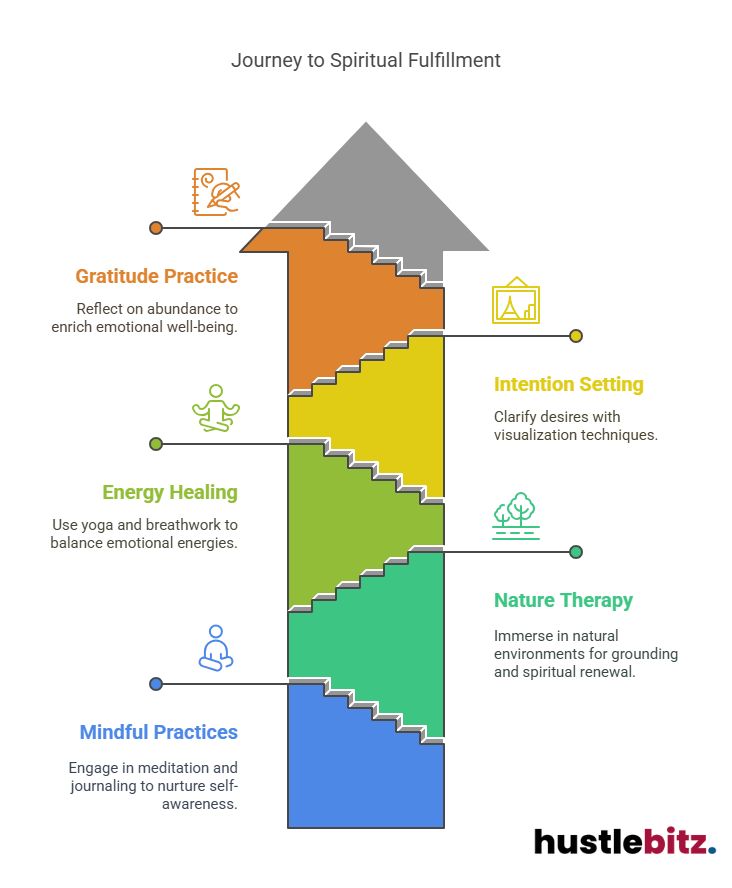Spiritual self-care is vital for connecting with your inner self, enhancing emotional resilience, and fostering authenticity. Engaging in practices like meditation, journaling, and spending time in nature facilitates self-discovery and reflection. Techniques such as gratitude journaling and mindfulness breathing can deepen self-awareness and promote a sense of inner peace. Moreover, structured rituals and mindful movement, like yoga, can amplify your spiritual journey, allowing for emotional balance and growth. These strategies create a pathway to understanding your desires and motivations. Exploring deeper aspects of spiritual self-care can greatly enrich your personal journey and well-being.
Key Takeaways
- Engaging in mindful practices like meditation and journaling nurtures self-awareness and emotional resilience, fostering a deeper connection with your inner self.
- Nature therapy, such as forest bathing, enhances grounding and presence, promoting spiritual renewal through immersion in natural environments.
- Rituals and energy healing techniques, including yoga and breathwork, cultivate deeper connections with oneself and balance emotional energies.
- Setting intentions and using visualization techniques like vision boards can clarify desires, reinforcing focus on personal aspirations and growth.
- Practicing gratitude through journaling and daily reflection shifts perspectives towards abundance, enriching emotional well-being and spiritual fulfillment.

Understanding Spiritual Self-Care

Understanding spiritual self-care involves recognizing the importance of nurturing one’s inner self and fostering a deeper connection with personal beliefs and values. This journey is integral to achieving emotional balance and promoting holistic wellness. Engaging in mindful practices such as meditation, journaling, and deep breathing can create sacred spaces where individuals can reflect and connect with their true selves.
Energy healing modalities, including Reiki or crystal healing, can further facilitate this connection, allowing for the release of blockages and promoting spiritual growth. These practices enhance one’s self-discovery journey, providing opportunities for intuitive guidance that aligns with personal empowerment.
Implementing self-compassion techniques is crucial in this process, as they encourage individuals to treat themselves with kindness and understanding during challenging times. Embracing self-compassion fosters resilience and reinforces the notion that spiritual self-care is not solely about achieving perfection but rather about honoring one’s journey and experiences.
As individuals explore these facets of spiritual self-care, they often find that their emotional balance improves, leading to a more fulfilling and purposeful life.
Ultimately, this understanding of spiritual self-care empowers individuals to cultivate a deeper relationship with themselves, encouraging them to live authentically and in alignment with their core values. By prioritizing this essential aspect of well-being, individuals can embark on a transformative path toward greater spiritual awareness and personal fulfillment.
Importance of Inner Connection

The importance of inner connection lies in its ability to foster self-awareness and emotional resilience, enabling individuals to navigate life’s challenges with clarity and purpose.
When we attune ourselves to our inner voice, we embark on a journey of self-discovery that reveals our authentic self. This process is crucial for personal growth, as it allows us to understand our desires, motivations, and emotions more profoundly.
Engaging in mindful living practices enhances this connection, promoting a state of inner peace that is essential for emotional healing. By being present and attentive to our thoughts and feelings, we cultivate self-awareness that helps us recognize patterns and triggers in our emotional responses. This level of awareness serves as a foundation for intuitive guidance, allowing individuals to make decisions that resonate with their true selves.
Healing practices, such as journaling, reflection, or creative expression, further facilitate this inner connection. They create space for exploration and understanding, enabling us to confront unresolved issues and embrace our vulnerabilities. As we deepen our relationship with ourselves, we become more equipped to face life’s uncertainties with grace and strength.
Ultimately, nurturing our inner connection is not merely a practice; it is a pathway towards enriching our lives through emotional resilience and authentic living. By prioritizing this connection, we empower ourselves to thrive in our personal journeys, fostering a sense of fulfillment and alignment with our deepest values.
Meditation Techniques to Try

Exploring various meditation techniques can significantly enhance your spiritual self-care practice, allowing for deeper inner connection and personal growth. Each method offers unique benefits, catering to different preferences and needs in your journey toward self-discovery.
Here are three effective meditation techniques you might consider:
- Guided Visualization: This technique involves using imagery to create a mental picture of a peaceful environment, enhancing relaxation and focus. It can also be integrated with chakra balancing to promote energy flow.
- Loving Kindness Meditation: This practice encourages the cultivation of compassion and love towards oneself and others. By silently repeating phrases of goodwill, you can foster a sense of connection and emotional healing.
- Mindfulness Walking: Combining movement with awareness, this practice encourages you to focus on each step while being present in the moment. It promotes physical well-being and a deeper connection to your surroundings.
Other techniques worth exploring include breath awareness, which centers on your breathing patterns; body scanning to promote relaxation; mantra repetition for focus and intention; transcendental meditation for deep calm; sound healing to align your energy; and creative visualization for manifesting desires.
Each method provides a distinct pathway to enhance your spiritual self-care routine, ultimately guiding you to a more profound understanding of your inner self.
Journaling for Self-Reflection
Incorporating journaling into your spiritual self-care routine can provide a powerful tool for self-reflection and personal insight, complementing the benefits gained from meditation practices.
Journaling serves as a structured space where individuals can engage in self-discovery prompts that illuminate their inner thoughts and feelings. This practice encourages emotional release, allowing for a cathartic outlet that can enhance mental clarity.
Gratitude journaling, in particular, fosters a mindset of appreciation, helping individuals to recognize and cherish the positive aspects of their lives. Engaging in creative expression through writing not only cultivates mindfulness but also serves as a form of self-exploration.
By integrating mindfulness exercises into your journaling, you can deepen your awareness of daily reflections, promoting a greater understanding of personal values and motivations.
Additionally, journaling can aid in goal setting by providing a platform to articulate aspirations and track progress. Dream analysis can also enrich self-reflection, as recording dreams may unveil subconscious patterns and desires that warrant attention.
Moreover, through the documentation of life lessons, individuals can gain insights into their experiences, leading to transformative personal growth.
Ultimately, journaling acts as a mirror, reflecting your thoughts and feelings back to you. By committing to this practice, you cultivate a deeper connection with your inner self, facilitating continuous growth and alignment with your spiritual journey.
Nature and Spiritual Renewal

Engaging with nature offers profound opportunities for spiritual renewal, allowing individuals to reconnect with their inner selves and the rhythms of the natural world.
Nature therapy serves as a powerful vehicle for this reconnection, enhancing one’s sense of grounding and presence. By immersing oneself in the outdoors, individuals can practice outdoor mindfulness, fostering a deeper appreciation for the beauty and complexity of life.
A few effective methods for experiencing spiritual renewal through nature include:
- Forest bathing: This Japanese practice encourages individuals to immerse themselves in the forest atmosphere, promoting natural healing and stress reduction.
- Wildlife observation: Engaging with local wildlife not only fosters an earth connection but also enhances awareness of seasonal cycles and the vibrant life surrounding us.
- Eco spirituality practices: Integrating elements such as plant rituals and reflections on nature’s cycles can deepen one’s spiritual journey and cultivate gratitude.
Incorporating these grounding techniques into daily routines allows for a more profound spiritual experience. Individuals can develop a deeper appreciation for the interconnectedness of all living beings, enhancing their journey towards self-awareness.
Ultimately, nature serves as a powerful ally in the quest for spiritual renewal, offering a sanctuary for reflection and a reminder of our intrinsic connection to the earth. Embracing these practices can facilitate a lasting transformation, nurturing both the mind and spirit.
Rituals to Enhance Spirituality
Rituals serve as powerful tools for enhancing spirituality, providing structured opportunities for individuals to cultivate deeper connections with themselves and the universe around them. By engaging in various practices, one can create sacred spaces that foster introspection and connection.
Mindful movement, such as yoga or tai chi, encourages awareness of the body and promotes a sense of grounding, while energy healing techniques help to balance emotional and spiritual energies.
Gratitude practices, which involve reflecting on what one is thankful for, can shift perspectives and enhance feelings of abundance. Breathwork sessions serve to calm the mind, allowing for a clearer connection to inner thoughts and feelings. Intention setting is another essential practice, as it encourages individuals to focus their desires and aspirations, guiding their spiritual journey.
Incorporating spiritual reading and sound therapy can deepen one’s understanding and resonance with the spiritual realm. Spiritual texts offer insights and wisdom, while sound therapy—utilizing instruments like singing bowls or gongs—can create transformative experiences that align the spirit with the universe.
Vision boards are practical tools for visualizing goals and aspirations, reinforcing one’s intentions. Lastly, ritualistic gatherings, whether with friends or within a community, can provide shared experiences that amplify energy and intention, creating a supportive environment for spiritual growth.
Final Thoughts
Spiritual self-care is a deeply personal and transformative practice that connects you with your inner self, fostering emotional resilience, clarity, and authenticity. By engaging in meditation, journaling, nature therapy, and mindful rituals, you can cultivate a deeper sense of awareness and balance in your life. Embracing these practices not only nurtures your emotional and spiritual well-being but also aligns your daily actions with your core values. Prioritizing this self-care journey allows for continuous growth, guiding you toward a more fulfilling and harmonious existence. Ultimately, spiritual self-care empowers you to navigate life’s challenges with grace, clarity, and purpose.




